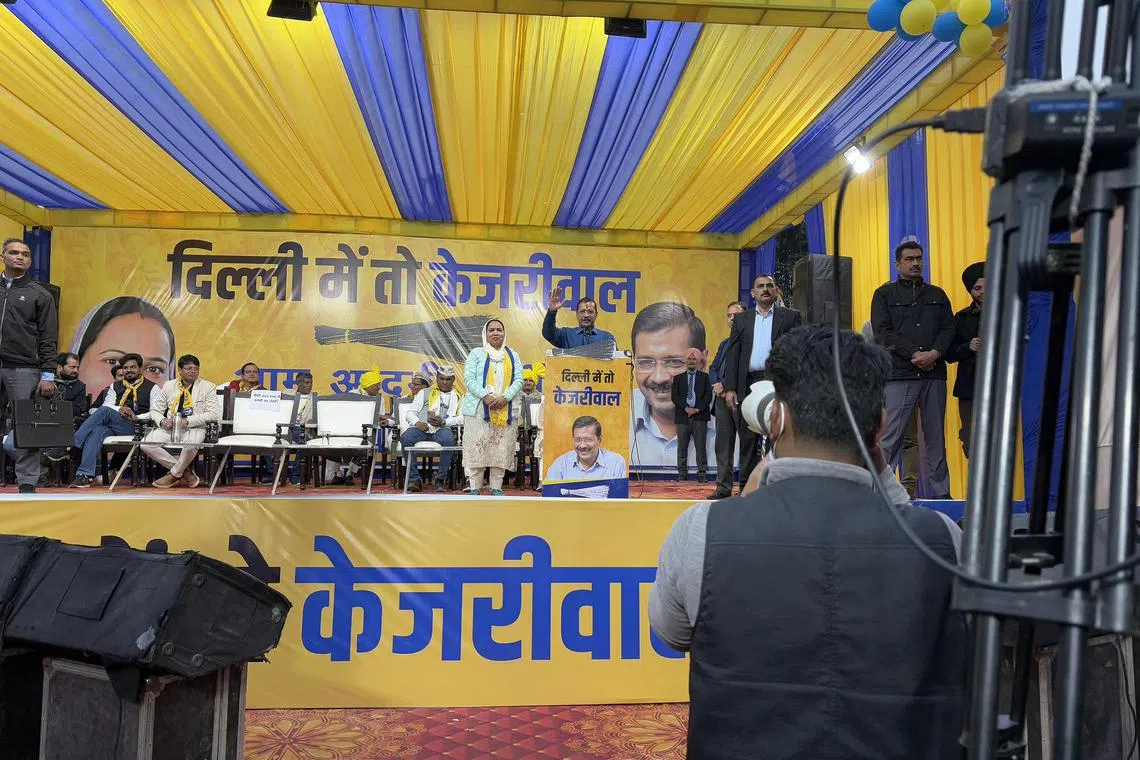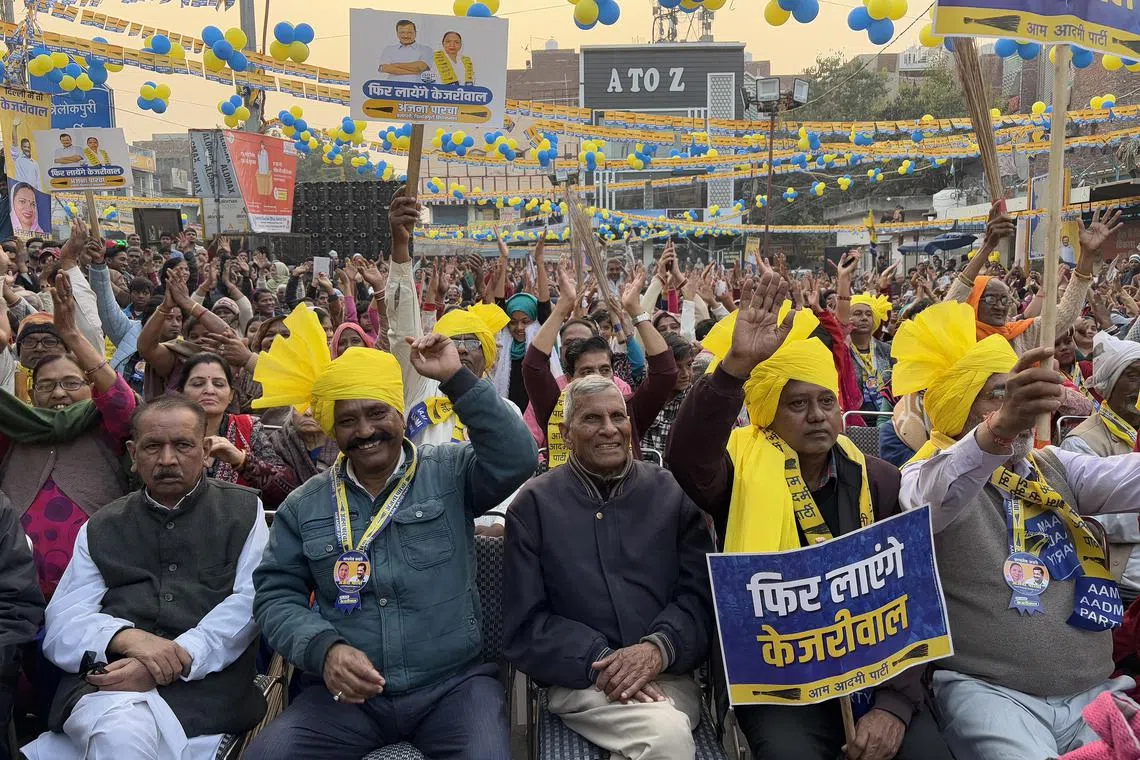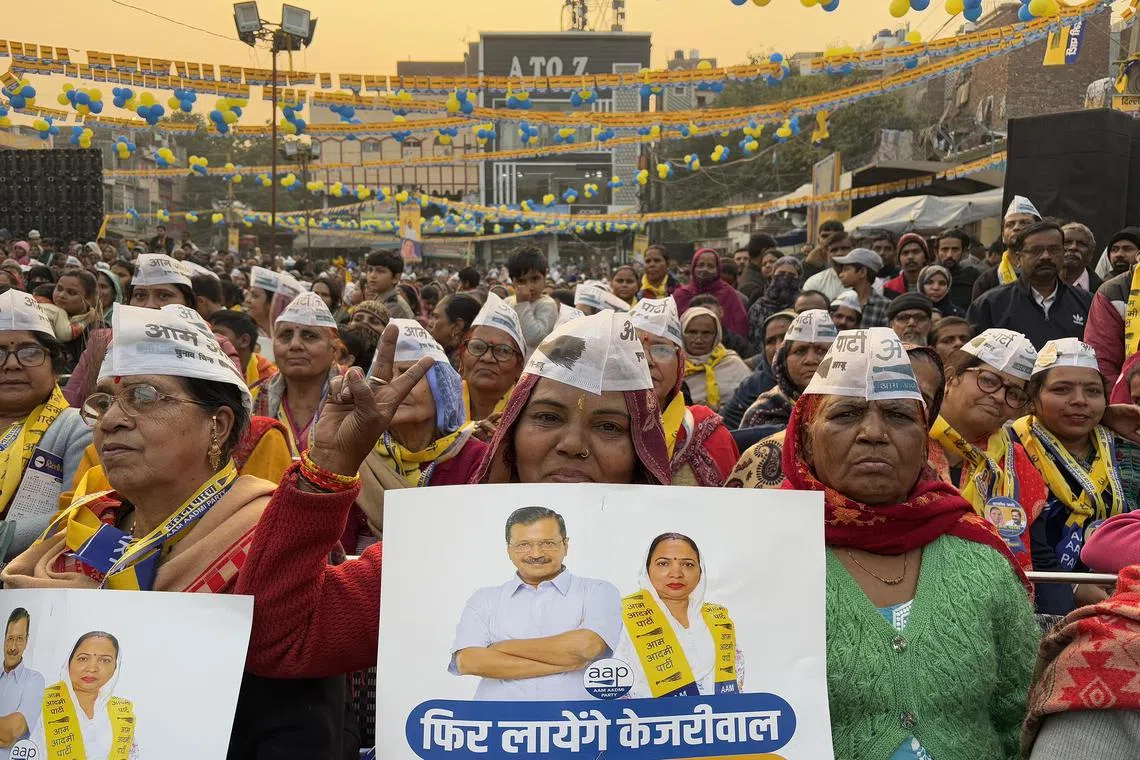Political parties woo Delhi voters with election goodies, but where will the money come from?
Sign up now: Get insights on Asia's fast-moving developments

Aam Aadmi Party chief Arvind Kejriwal addressing an election rally in Trilokpuri in east Delhi on Jan 22.
ST PHOTO: NIRMALA GANAPATHY
Follow topic:
NEW DELHI – Whoops of delight went up from the crowd each time Aam Aadmi Party (AAP) chief and former Delhi chief minister Arvind Kejriwal announced campaign pledges at a Jan 22 election rally in Trilokpuri, a congested locality in east Delhi.
“I will give my sisters in Delhi 2,100 rupees (S$33) every month! Free bus travel and a 50 per cent (discount) on metro for students! Free electricity-water benefit for tenants!” the social activist-turned-politician declared.
The crowd, comprising mainly supporters and some curious onlookers, cheered and waved brooms – the AAP’s party symbol – as Kejriwal ran down his list of freebies and welfare schemes he promised to implement if the party is returned to a third consecutive term in power.
In the lead-up to Delhi’s state assembly election on Feb 5,
The AAP, which has ruled the state for a decade, has also promised Hindu and Sikh priests a monthly honorarium of 18,000 rupees, and an unspecified cap on private school fees, among other things.
The announcement of welfare schemes and freebies is seen as a bid to counter anti-incumbency sentiment, especially after its leaders – including Kejriwal, who is campaigning for the New Delhi seat while out on bail – were caught up in corruption charges that he and his party have denied.
The Bharatiya Janata Party (BJP) has long criticised the AAP for fostering a “freebies culture” in Delhi. But that has not stopped the BJP, which won eight of the 70 assembly seats in 2020, from jumping on the bandwagon.
Still gunning to return to power after a 27-year gap in Delhi, the BJP has unveiled a bouquet of goodies targeting different segments of society. This includes a monthly payout of 2,500 rupees for poor women, a one-time payout of 21,000 rupees for pregnant women, and a one-time handout of 15,000 rupees for youth preparing for competitive examinations.
BJP MP Praveen Khandelwal, who represents Delhi’s Chandni Chowk constituency in the Lower House of Parliament, said his party was offering welfare schemes targeted at the economically weaker sections of society, and thus they could not be termed freebies.
Not to be left behind, the Congress Party, which dominated the city a decade ago but won no seats in the past two elections, has promised 2,500 rupees a month for women and 8,500 rupees monthly for a year to unemployed, educated young people.
For voters, there is plenty to choose from in these elections.
“It is a three-cornered fight in Delhi. So many schemes are being offered. But at the end of the day, it all depends on which party can implement the schemes the best,” said auto driver Sanjay Pandey, 38.
“For me, AAP has given free electricity, water and improved government schools, so they do have a proven record in Delhi.”
Even if voters are biting, the question remains: How will the winner make good on these populist campaign promises? And will funding such schemes come at the expense of more critical needs, like infrastructure spending?
“There is concern because there is no money. Every state government is in deficit,” noted Professor Jagdeep Chhokar, founding member of the Association for Democratic Reforms, which works on political and electoral reforms.
Funding these schemes will come with trade-offs, he said, adding: “It is basically irresponsible.”
He noted: “Delhi’s revenue base is very limited, and Delhi revenue is heavily controlled by the federal government... So where will the finances come from?”
The freebies formula has been proven to work in India. In the recent assembly election in the western state of Maharashtra, for one, a promise of 1,500 rupees for women drew a larger voter turnout from this base in favour of the incumbent BJP-led alliance.
The AAP has governed Delhi since 2015 on the back of attractive campaign promises, which included up to 200 units of free electricity and 20,000 litres of free water a month. It further gained voters’ support by making good on these promises over the last decade.
At the last election in 2020, the AAP won 62 out of 70 seats after pledging to open free health clinics in multiple localities and to focus on improving government schools.

Supporters of the Aam Aadmi Party listening to party leader Arvind Kejriwal at an election rally in Trilokpuri in east Delhi on Jan 22.
ST PHOTO: NIRMALA GANAPATHY
But this has come at a price. The state’s subsidy bill for power has doubled over the decade, from 14.42 billion rupees to 32.5 billion rupees in 2024. For the 2024-2025 financial year, Delhi’s fiscal deficit has been pegged at 65.65 billion rupees, up from 2.21 billion in 2015-2016.
“People are asking me, ‘where will the money come from?’, and I tell them, I am Baniya’s son, a magician. Don’t worry,” Kejriwal was quoted as saying by the Indian media. Baniyas have traditionally been involved in moneylending and trade, and the community is known for its prudent money-handling skills.
Other parties have also brushed off financial concerns, saying that they have done the maths.
The BJP said it would share its financial plan, but did not specify when. “We have taken cognisance of the financial repercussions and additional revenue needed at the party’s highest level,” said BJP MP Khandelwal.
Over 700 candidates are vying for 70 seats in the Delhi assembly.
The state of 33 million people is seen as a political prize as it houses capital city New Delhi and the seat of India’s federal government.
The BJP, which is in power at the federal level, has an added impetus. Besides breaking the AAP’s decade-long dominance in Delhi, it is keen to curb the AAP’s ambitions to expand nationally.
The AAP, which was originally seen as a regional party focused on Delhi, has gained significant ground on a mix of soft Hindu nationalism and focus on education and health. It won Punjab in 2022, rattling the BJP.
But the AAP and Kejriwal, who came onto the political scene as an anti-graft activist, are facing their toughest election yet.

Supporters at an Aam Aadmi Party election rally – where freebies and welfare schemes were promised by party chief Arvind Kejriwal – in Trilokpuri in east Delhi on Jan 22.
ST PHOTO: NIRMALA GANAPATHY
Kejriwal quit as Delhi chief minister in 2024 and appointed colleague Atishi Marlena, who is contesting as a candidate in the polls, after he was jailed in a corruption case.
Kejriwal was charged by the Central Bureau of Investigation in July 2024 for allegedly receiving kickbacks in a 2022 liquor scam case. This, along with the arrests of other AAP leaders purportedly involved in the case, has led to criticism by the BJP of poor governance.
The AAP has denied the graft allegations, and Kejriwal claims he is running for election as people want to see him return as chief minister.
“A defeat for AAP would push back the party’s national ambitions. AAP by its very nature is not a regional party. It is a national party and its leaders speak Hindi (which is spoken in most parts of north India),” political analyst and commentator Amitabh Tiwari said, underlining why the BJP saw the AAP as a political threat, making the fight for Delhi even more crucial.
“It is very difficult to predict who wins this time, but AAP is in a weaker position compared with the previous two elections,” he noted, amid doubt among voters over whether Kejriwal could continue to effectively govern Delhi.
Correction note: In an earlier version of the story, we had wrongly referred to BJP MP Praveen Khandelwal as representing Delhi’s Chandni Chowk constituency in the Upper House of Parliament. It should be the Lower House of Parliament.
Nirmala Ganapathy is India bureau chief at The Straits Times. She is based in New Delhi and writes about India’s foreign policy and politics.


